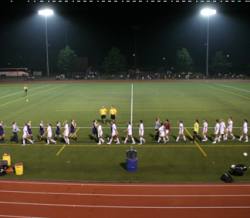Friday Night Lights
- Details
- Hits: 5361
 Advocates for the installation of lights at the turf field of Scarsdale High School attended the Scarsdale School Board meeting on Monday November 22. Rippy Philipps and Steve Nicholas represented the Scarsdale Youth Football League to ask for the Board’s prior approval for a private fundraising effort for the project.
Advocates for the installation of lights at the turf field of Scarsdale High School attended the Scarsdale School Board meeting on Monday November 22. Rippy Philipps and Steve Nicholas represented the Scarsdale Youth Football League to ask for the Board’s prior approval for a private fundraising effort for the project.
The group would like to collect $300,000 to install lights at the field. The lights would allow for extended use of the field by Scarsdale High School and Middle School schools teams as well as club teams, including the Scarsdale Youth Soccer and Football teams. With a lit field, evening practices and games could be scheduled as they are now in the neighboring towns of Eastchester, White Plains and Ossining.
Philipps and Nicholas contend that lighting the field has many advantages. First, it would bring more students and parents to the field at night, thereby creating a sense of community. Teams who now have limited practice time due to wet fields and darkness would have additional playing time. Volunteer coaches, who cannot leave work before the sun goes down would be able to coach under the lights at night, thereby increasing volunteerism. In their view, lighting the field would help to combat drug and alcohol use by teens who could gather at the school and participate in or watch community games.
At face value, a gift of $300,000 for infrastructure improvements to the schools at a time when strapped budgets have prevented the athletics department from funding any major projects seemed beneficial. Coincidentally, the gift proposal came just weeks the League of Women Voters convened a panel of experts to explore the establishment of an educational foundation that would govern large gifts to the schools. Many of the issue discussed by that panel emerged in the conversation about the gift of lights on Monday night and resulted in more questions than answers.
Among these questions were both philosophical and practical concerns about the acceptance of the gift and installation of the lights, including:
- How would the gift affect the School Board’s role of making budget priority decisions?
- Is it desirable to use outside funds to support the schools?
- Would the need to study this issue interrupt the regular business of the Board and the budgeting process and strain the limited resources of the staff?
- Should this decision be considered on its merits or as part of a larger discussion about the establishment of a foundation?
- Would a gift of this size benefit the entire community?
- Would the group making the contribution exercise undue influence?
- Is the installation of lights a priority for the High School Athletics Department?
On a more practical level, the Board and Dr. McGill discussed the following:
- Would nighttime practices and games interrupt the academic program at school and family time?
- Would night games require extra supervisory, traffic and custodial staff on school grounds?
- Even if the Board agreed to a schedule for field use now, would there be pressure to increase hours of play in the future?
- What are the costs to maintain the lights, including electricity, bulbs and repairs and who would fund this?
- Would Fox Meadow residents who surround the field object to bright lights in their neighborhood and to increased evening traffic to the school?
- Looking at this project as a cost vs. benefit analysis, would the monies be spent for the maximum benefit? i.e. would a few additional hours of field time justify the cost?
Dr. McGill and Linda Purvis offered information about current priorities for the High School Athletic Department and apparently lights were not on the list. There is a need to renovate the fitness center and bring it up to code at an estimated cost of $200,000. The baseball diamond has drainage issues and needs to be graded and repositioned and McGill added that the turf field is in need of repairs.
In order to get more information, the Board decided to convene a study session to formulate a list of questions to be answered by advocates for the field concerning schedules for usage, estimated costs and revenues and the impact of lights on the school and the neighborhood.
At this point in the meeting, Dr. Nicholas again addressed the Board, asserting that the lights were for the” entire community” and that they would bring kids back to the school at night. He challenged the Board to “go out and speak to the community,” claiming that “this is what they (the community) wants and that the elected Board members were “losing perspective” on what they needed to provide.
Gail Leone a co-President of Maroon and White spoke in support of the lights and assured the Board that students with night practices would do their homework in the afternoon as they are “disciplined school athletes.” A Fox Meadow resident said “the lights would offer a layer of security of those who walk on the track at night, and that lights “would be great for the kids and the entire community.”
While the Board thanked the Association for their generosity, the discussion was an excellent illustration of how ad hoc funding initiatives can influence programs funded by the district and divert the Board from their regular business. It will be interesting to follow the process and see how it evolves. We will continue to track the discussion and report to you.
A Grenade on the Lawn
- Details
- Hits: 3877

On the morning of November 18, Ms. Judy Messenger of Birchwood Lane in Hartsdale found a strange item on her lawn. It looked like a grenade, and without realizing it could be live, she picked it up and threw it into her garbage can.
She called the police who brought members of the Greenburgh SWAT and Technical Rescue team to investigate. The Westchester County Police Bomb Squad was also put on notice.
The SWAT team found the hand grenade in the garbage can with the safety pin intact and spoon attached. They identified it as a World War II era Mk2 style hand grenade and determined that it was inert. The fuse had been deactivated and the grenade was hollow. Police searched the area for clues to the origin of the grenade.
Could this incident be related to one that involved a live bazooka rocket that was found in the attic of a Joyce Road home in Hartsdale in May? Is someone storing arms from World War II in the neighborhood?
Election Update Cohen Vs. Oppenheimer
- Details
- Hits: 5275
 Westchester voters are still wondering who will emerge as the victor for the State Senate seat for the 37th District. The count on the Westchester Board of Elections website remains at 40,527 for Oppenheimer versus 40,023 for Cohen, giving Suzi 50.31% of the vote to Bob’s 49.68%.
Westchester voters are still wondering who will emerge as the victor for the State Senate seat for the 37th District. The count on the Westchester Board of Elections website remains at 40,527 for Oppenheimer versus 40,023 for Cohen, giving Suzi 50.31% of the vote to Bob’s 49.68%.
According to a recent email from the Cohen campaign, 10,000 votes are uncounted, which is “twice as many as any other Senate District in the state and more than most Congressional races. They also report “the emergency ballots, which are a third of the uncounted votes, are the first scheduled to be counted,” and that they “are due in court next week where the court will set the new schedule for the count.”
From Cohen’s email, it is not clear when this will be resolved. In order to understand more about why the results are so murky, Scarsdale10583 spoke to Milt Hoffman, who retired in 2001 as a senior editor of the Journal News after 50 years as a reporter, county and state government correspondent, politics columnist, editorial page editor.
He gave us the following observations on the vote, the new machines and the possible outcome.
First, the total votes shown in the race now stand at 80,550. According to Hoffman, “the 80,000 vote turnout estimate is low. Two years ago, Oppenheimer defeated Liz Feld by 78,862 to 42,036, and a total of 142,821 turned out to vote in the district. I wouldn't be surprised if the total turnout this year was over 100,000.”
Hoffman also noted that the new voting machines might have caused confusion among poll workers. Here are his comments:
“In the past, on election night, the inspectors read the results off the back of the election machine, line by line. This year, tapes recorded the vote. They give a total for the candidate from all the lines the candidate had. There is also a breakdown of how the candidate did on each party line. In one district, the results were taken by party; in another, they just jotted down the total for all the lines and didn't bother with the party vote.”
According to Hoffman, there were also problems contacting the Board of Elections. “I think there was confusion in calling in the votes, and the time it took. One person said she couldn't reach anybody at the Board of Elections by phone until 11 p.m. The lines were always busy. Inexperience with the new system held up the tallying on election night. The Board of Election called it quits that night when only about 80 percent of the districts had called in countywide.”
On the counting of the emergency ballots, Hoffman is confident that the Board of Elections will be accurate.
He says, “It is a slow process, but a sure one. Westchester's count of ballots always has been slow, because the Board traditionally makes painstaking efforts to count each ballot correctly. My guess is that the tallies have been finished, but that all the totaling has not been finished or is being checked twice and three times because of the new system. The fact that the Board seems to be late is a good thing; that means they take great care to be accurate.”
Furthermore, he added, “When it comes to some emergency ballots, they have to check that the person actually was registered in the district. Often there is a mistake at the Board and the voter's card is sent to the wrong district. The voter claims he or she is registered; the person is allowed to cast a ballot that is then placed in a separate box. When the box gets to the Board of Elections, the name on the outside of the sealed envelope is checked to determine whether or not the person was registered. If so, the outside envelope is discarded and the ballot in the inside envelope is placed in a separate box with other such ballots and opened without anyone knowing the name of the voter (keeping the ballot secret).”
Last, in Hoffman’s experience, the votes from the “paper ballots usually reflect the percentage of the machine count,” so he predicts the spread for Oppenheimer will hold up. However, no one can predict what will be found in the sealed envelopes.
Scarsdale10583 will continue to monitor the process and communicate developments to you.
Rita Golden to Chair Scarsdale Bowl Committee
- Details
- Hits: 5398
 Rita Golden has been named Chair of the 2011 Scarsdale Bowl Committee. The appointment was announced by Jackie Irwin, President of the Scarsdale Foundation. As Bowl Committee Chair, Golden will head the nominating committee and the community celebration dinner to be held on Wednesday evening, April 6, 2011 at Lake Isle Country Club. The Scarsdale Bowl is awarded annually in the spring to a Scarsdale resident in recognition of his or her voluntary public service to the community. The Executive Secretary/Treasurer of the Scarsdale Bowl is Nancy Michaels.
Rita Golden has been named Chair of the 2011 Scarsdale Bowl Committee. The appointment was announced by Jackie Irwin, President of the Scarsdale Foundation. As Bowl Committee Chair, Golden will head the nominating committee and the community celebration dinner to be held on Wednesday evening, April 6, 2011 at Lake Isle Country Club. The Scarsdale Bowl is awarded annually in the spring to a Scarsdale resident in recognition of his or her voluntary public service to the community. The Executive Secretary/Treasurer of the Scarsdale Bowl is Nancy Michaels.
When asked about her appointment, Golden said, “The Scarsdale Bowl is given each year to an outstanding individual who has generously donated his or her time and talent over many years to benefit our community. We have put together a wonderful committee this year to select the 2011 Bowl winner, and I look forward to working with them to plan an evening that will honor not only the recipient, but all volunteers who work so hard to make Scarsdale such a special place to live.”
Golden has been active in a range of community and volunteer organizations, including serving as President, Vice-President and Trustee on the Scarsdale Board of Education; PT Council President and Secretary; President of the Quaker Ridge PTA; President, Vice-President, and ongoing board member of the Westchester-Putnam School Boards Association; President of the Youth Employment Service, and Co-Chair of last year’s Scarsdale Schools 225th Anniversary. She has also served as a board member of the Scarsdale/Edgemont Family Counseling Service, Kids’ B.A.S.E., League of Women Voters, TVCC, Scarsdale Teen Center, Scarsdale Youth Advisory Council, Task Force on Drugs and Alcohol, Westchester County’s Women’s Advisory Board, and as a member of several Village and School advisory and nominating committees, as well as the Scarsdale Bowl Committee. Currently, Golden sits on the STEP board, and outside of Scarsdale, is the Vice-President of the Mount Pleasant Cottage School Board, a public school that serves students in residential treatment, and President of its foundation, and a member of the Lower Hudson Education Coalition Joint Policy Committee.
Golden is the marketing coordinator for Weill Cornell Medical College’s Department of Psychiatry at New York-Presbyterian Hospital. A 33-year resident of Scarsdale, she and her husband Steven have two daughters, Meredith and Alissa, both graduates of the Scarsdale schools.
The Scarsdale Bowl is administered by the Scarsdale Foundation which operates as a not-for-profit community foundation to promote the civic welfare. It does so by supporting institutions and individuals in a manner that encourages educational and human development in the community. The Foundation provides financial aid to college students entering their sophomore, junior and senior years. It also administers a number of special purpose funds, and makes grants for specific purposes which have included the Scarsdale Volunteer Ambulance Corps and the Scarsdale/Edgemont Family Counseling Service.
A Big Week for the Greenburgh Police
- Details
- Hits: 6190
 Greenburgh Police issued two press alerts this week: one concerning a suspicious envelope received at the New York Sports Club in Elmsford and another about a large drug bust in Dobbs Ferry.
Greenburgh Police issued two press alerts this week: one concerning a suspicious envelope received at the New York Sports Club in Elmsford and another about a large drug bust in Dobbs Ferry.
On Tuesday, an employee of the New York Sports Club on Executive Boulevard in Elmsford opened an envelope that contained a white powder-like substance that irritated her skin.
Police, fire, EMS and Hazmat personnel were sent to the scene where they evacuated the club and had four club employees and a postal worker go through a decontamination process. The suspicious envelope was taken to the Westchester County Department of Laboratory Services for testing.
On November 4th, the Greenburgh Drug and Alcohol Task force, acting with the US Drug Enforcement Administration and the Westchester County District Attorney’s office executed a narcotics search warrant in Dobbs Ferry. The warrant was based on an eleven-month investigation of suspicious activity at 5 Gould Avenue in Dobbs Ferry.
On the premises, police found 100 pounds of marijuana, packaged for sale. In addition to the marijuana, which was valued at $300,000 they found $67,000 in cash.
Five defendants were taken into custody for possession, and one of the suspects was also found to be wanted by the New York City Police for kidnapping. All five were sent to Westchester County Jail where they will be held without bail until their court date on Thursday, November 18.
Car break-in at Seely Place School: A Chappaqua woman parked her Honda Odyssey at Seely Place while she watched a soccer game on the afternoon of 11/7. When she returned to her car, she found her car window smashed. Her pocketbook, which she had left in the car, was still there, but $300 was missing from her wallet.
Shoplifters: The loss prevention officer at Marshalls caught two women shoplifting at the store on November 1. He saw them conceal merchandise and when they left the store without paying, he stopped them and called the police. Judi Neil of the Bronx and Patricia Trinidad of Yonkers were booked and given court dates.Also at Marshalls on November 2, Jose Portorreal of the Bronx was caught switching price tags on merchandise and returning merchandise with switched tags in order to make a profit. The Greenburgh Police took him into custody.
A Best Buy employee was arrested on 11/1 when it came to light that he had issued himself an unauthorized gift card in the amount of $1,063.61 and used the gift card to make purchases at other Best Buy locations. The employee, Michael Guzman, age 20 of Mt. Vernon was arrested and taken to Greenburgh Police Headquarters.
On November 7, an employee of CVS on Central Avenue in Hartsdale reported that a black man, approximately 6 feet tall, came into the store, grabbed six Touchscreen MP3 players, each valued at $87.99, and ran out of the store. He fled in a small silver car driven by a woman. The store will check the videotape to see if they can see the suspect.
Disputes: Precious Jones of the Bronx got into a fight with a Bee Line bus driver when he overshot her stop on Central Avenue on November 6th. When she eventually got onto the bus, her metro card did not go through. As she was talking on the phone, the bus driver tapped Ms. Jones arm and she became verbally abusive to the driver. The woman was removed from the bus by a supervisor and the police took her to White Plains station to catch a train.
Missing Man: A Hartsdale woman reported that her husband was missing on 11/6. The 69 year-old man drove to Mohegan Sun Casino on Thursday 11/4 and when his wife had not heard back from him by Saturday she called the police. Police called the casino who found that the man’s car was parked in the valet parking lot at the casino, though the man was not registered at the hotel. They also checked the local hospital and there was no record of the man who suffers from early stage dementia. The Greenburgh Police entered the victim on the missing person registry.
On 11/5 Social Services workers followed up on a claim from a Barclay Road boy. He told his teacher at school that his father “got mad and struck him causing a bruise to his back” because he didn’t want to do his homework. Social Services found no signs that the boy was being mistreated or neglected.






